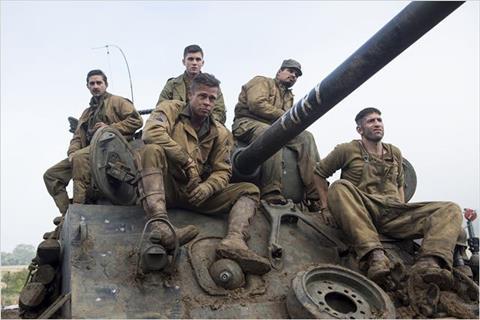Dir/scr: David Ayer. US. 2014. 134mins

The tone of the World War II drama Fury is familiar, but writer-director David Ayer brings his own rhythm to it. The umpteenth story about a ragtag group of American soldiers fighting the Nazis, Fury is strongest when it casts a weary, unemotional eye on the moral ambiguity that blossoms in such a barren, bloody landscape. That doesn’t mean it’s a particularly groundbreaking achievement, but some nicely barebones performances, particularly from Brad Pitt, keep the film grimly riveting and thoughtful even when conventionality eventually takes hold.
In the past few years, Pitt has aged into an effortless leading man less swayed by brooding heroism than reconciled gravitas. His Wardaddy isn’t meant to be flashy or even exactly memorable: He’s just one more skilled cog in a killing machine, and Pitt honours the man’s compelling anonymity.
Opening October 17 in the States, Fury will require Pitt’s star power to help sell a film that, while a war movie, is a little more subdued than genre fans may hope. (That said, it’s still appreciably violent, especially in the closing section when our outnumbered heroes take on an entire German unit.) The betting is that Fury will do solid business without being an outright smash, although that could change if word-of-mouth is strong enough. Ultimately, the question will be whether audiences want to see a WWII movie that often evokes other, more striking combat films such as Saving Private Ryan or even Inglourious Basterds.
The film focuses on the final throes of the fighting: It’s April 1945, and Wardaddy (Pitt) is leading his tank crew deep into German territory. Alongside the religious Boyd (Shia LaBeouf), uncouth Grady (Jon Bernthal) and taciturn Gordo (Michael Peña), Wardaddy is now joined by Norman (Logan Lerman), a younger man who recently joined the military but was never trained for combat, let alone working inside a tank.
One of the refreshing elements of Fury initially is that Ayer (End Of Watch, the writer of Training Day) deglamourises combat. Wardaddy and his squadron aren’t engaged in a noble or exciting mission: As they have for years, they’re just moving to their next location so they can kill more Nazis in the hopes of finally ending this damn war. There’s a stripped-down, almost blasé resignation to Ayer’s treatment of life as World War II prepares to wrap up. (With everyone on screen exhausted and punchy, the characters don’t have much time for rousing, pseudo-profound speeches or grand dramatic gestures.) Consequently, for a film called Fury, the story is actually muted, the crush of military rigmarole and the seemingly endless procession of missions consciously tamping down the excitement and tension inherent in war movies.
And yet, Ayer utilises this deceptively low-key approach to set us up for battle scenes that have a compact punch. Rather than wowing us with elaborately orchestrated war sequences that are tactically brilliant, the filmmaker focuses on the nuts-and-bolts urgency: The Nazis want to kill everyone in Wardaddy’s tank, and he and his men want to kill all of them. The blunt simplicity of Fury’s battle scenes is appropriate to the hulking, claustrophobic machine that houses Wardaddy and his squadron, bulldozing over its enemies when it’s not eviscerating them from a distance with lethal mortar shells. Fury goes a long way on this hard-edged, gut-level intensity.
In Ayer’s previous films, he’s shown an interest in dramatizing the ways that men interact with one another in high-pressure jobs, particularly police work. He understands the complexity of macho bonding, as well as the testosterone overkill that can poison such relationships. These interests are on display again in Fury, most notably in a remarkable, risky sequence involving the sweet-natured Norman, the pragmatic Wardaddy and some helpless German women (Anamaria Marinca, Alicia von Rittberg) they find in an overrun village. Consciously stopping the action for an extended interlude that introduces elements of sympathy, primal sexual urges and male posturing, Ayer wants to show us how war risks dehumanising individuals, unless they have the courage to resist their basest tendencies. The sequence is overlong and a bit unwieldy, but it’s key to the sort of gender insights that Ayer likes to unearth.
The filmmaker’s great work exploring the codes of male behaviour is unfortunately mitigated by cardboard characters. In essence, Fury’s tank crew consists of The Stoic Leader, The Religious Guy, The Psycho Hothead, The New Kid, and The Non-Descript Non-White One. Ayer pays homage to archetypes so musty that it’s doubly disappointing when he fails to subvert our expectations. (The overwhelmed, baby-faced Norman at first shocks us with his quick adoption of Wardaddy’s kill-or-be-killed philosophy. But soon the character plays out exactly as one might guess. Lerman exudes soulfulness in the role, but he can’t make his character’s arc any less predictable.)
Additionally, a progressively more formulaic plotline starts to assert itself, pushing Fury toward the clichéd. The film builds to an Alamo-like showdown between Wardaddy’s men and a heavily armed Nazi squadron, and while Ayer stages the battle effectively, the leanness of his execution can’t distract from the fact that we’ve seen this sort of last stand many times before on film.
Thankfully, Ayer’s cast put enough care into the proceedings that they elevate what’s often humdrum about the storytelling. In the past few years, Pitt has aged into an effortless leading man less swayed by brooding heroism than reconciled gravitas. His Wardaddy isn’t meant to be flashy or even exactly memorable: He’s just one more skilled cog in a killing machine, and Pitt honours the man’s compelling anonymity. As for LaBeouf, Fury represents one of his strongest turns in far too long. With a modicum of actorly tics, he plays Boyd as a god-fearing soldier who sees no discrepancy between the Lord’s love-thy-neighbour message and his own thirst to wipe out Nazis. It’s a gimmicky role, but LaBeouf invests in it fully. Peña, so funny and vibrant in End Of Watch, is underused, but Bernthal registers pungently as a coarse, hateful soldier who isn’t much of a hero. Nonetheless, he makes us secretly suspect that he’s indicative of the type of thoughtless warrior that populates the battlefield more than we’d care to imagine.
Production companies: QED International, LStar Capital, Le Grisbi, Crave Films
International sales: QED International, www.qedintl.com
Producers: Bill Block, David Ayer, Ethan Smith, John Lesher
Executive producers: Brad Pitt, Sasha Shapiro, Anton Lessine, Alex Ott, Ben Waisbren
Cinematography: Roman Vasyanov
Editors: Dody Dorn, Jay Cassidy
Production designer: Andrew Menzies
Music: Steven Price
Website: www.fury-movie.com
Main Cast: Brad Pitt, Shia LaBeouf, Logan Lerman, Michael Peña, Jon Bernthal, Jason Isaacs, Brad William Henke, Jim Parrack, Xavier Samuel, Scott Eastwood, Kevin Vance, Anamaria Marinca, Alicia von Rittberg





















